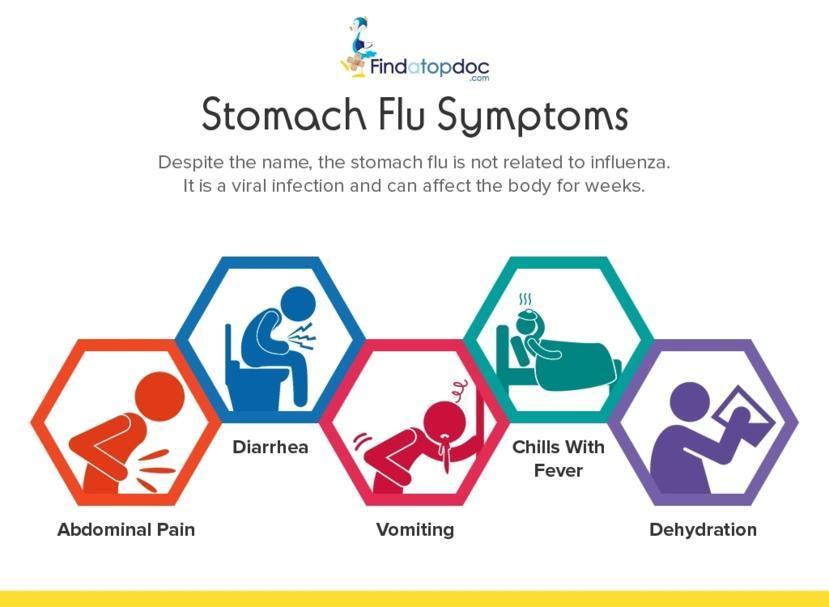What Are Treatment Options for the Stomach Flu?

What is the stomach flu?
The stomach flu, as the name indicates, is not related to the respiratory disease influenza. It is the common name for gastroenteritis, a condition characterized by irritation and inflammation of the gut. This disease spreads through contaminated food and water, and is caused by a number of organisms, like viruses, bacteria, and parasites. Escherichia coli, Salmonella, Campylobacter and Shigella are the bacteria that can cause gastroenteritis. Among the viruses, adenoviruses, rotaviruses, calciviruses, astroviruses, and norovirus are the major culprits. The parasites that cause gastroenteritis include Giardia and cryptosporidium. Many foods and chemicals may also irritate the gastrointestinal tract, resulting in stomach flu.
In most cases, the symptoms may go away without any specific treatment, especially if the condition is caused by viruses. Depending on the cause and the severity of the symptoms, it may take three to five days for them to subside. Individuals who experience severe symptoms should seek medical attention.
The stomach flu can be very severe and fatal for infants, older adults, and people with a weak immune system, such as those who have diabetes or HIV.
There is no specific treatment for stomach flu, so the best option is to prevent yourself from getting this infection. Avoid food and water that can be contaminated and wash hands properly at frequent intervals. There are some home treatments that can help provide relief from the symptoms.
What are the symptoms of the stomach flu?
The symptoms to watch out for include:
- Fatigue
- Presence of blood in the stool
- Continuous vomiting
- Nausea
- High grade fever
- Pain in the lower right part of the abdomen
- Dehydration
- Headaches and muscle pain
Normally the symptoms of stomach flu begin to appear within 1–3 days of getting the infection and the symptoms can range from mild to severe. Symptoms will last for 3 to 7 days and in severe cases they may last 10 days.
What are the causes of the stomach flu?
An individual can get a stomach flu infection if they consume contaminated food or water, or share food, vessels, or towels with an individual who has the stomach flu.
Some of the viruses that can cause this infection are:
- Norovirus: Norovirus can affect anyone be it children or adults. It is one of the most common reasons for food-borne infections across the world. Norovirus can spread among individual who reside in confined places.
- Rotavirus: This is one of the most common causes of viral gastroenteritis among children across the world. They get the infection when they put their fingers or any other item into their mouth which is infected with the virus. This infection mostly affects infants and smaller children. In adults, there may be no signs or symptoms if they are infected with rotavirus, but they can still spread the infection to others.
What are the risk factors of the stomach flu?
Worldwide, viral gastroenteritis can affect anybody irrespective of their age, gender, race or background. However, there are some individuals who are more at the risk of suffering from gastroenteritis.
- Young children: Children who are in day care or child care centers or even elementary schools are more likely to get stomach flu, since younger children have lesser resistance because their immune system has not completely matured.
- Older adults: Adults above the age of 65 tend to have more illnesses than younger people, and a weaker immune system. Particularly, adults who are in nursing homes are more at risk of suffering from stomach flu.
- Dormitory or camp residents: People who reside in close groups are more susceptible to viral gastroenteritis, for instance people who reside in dormitory, military camps, prisons, etc.
- Individuals with weak immune system: Anyone who has a weak immune system due to some medical conditions like HIV/AIDS, chemotherapy, kidney problem, or any other condition, are at a higher risk of contracting the stomach flu.
What are the complications of the stomach flu?
One of the main complications associated with stomach flu is dehydration, which is characterized by severe loss of water, salts, and minerals from the body. If a healthy person ensures to hydrate themselves well with fluids to make up for the loss through vomiting and diarrhea, then they may not suffer from dehydration.
Younger children, older adults, and people with a weak immune system may have severe dehydration problems when the body loses a lot of fluids. There may be a need for hospitalization to provide these patients with the required fluids through IV. Dehydration, if not treated on time, can be fatal.
What is stomach flu treatment like?
Medications are recommended based on the actual cause of gastroenteritis. Bacterial gastroenteritis is treated with antibiotics. Antibiotics are also suggested for those who are susceptible to infections, like people with weakened immune systems. Antiemetics, like ondansetron and promethazine, are recommended to control vomiting. These may be given as a suppository if the person is not able to keep the medication down. Anti-diarrheal medications, like atropine and loperamide, help to reduce diarrhea. These medications are not given if the condition is caused by toxins.
Follow-up care is equally important in treatment of gastroenteritis. Those who are recuperating from this condition should slowly get back to their normal diet. Opt for bland, easy to digest foods that provide nutrition but do not irritate the stomach further. Crackers, bananas, rice, and chicken are good choices while getting back on track.
What are the required lifestyle changes and home remedies?
There is no specific treatment for curing the stomach flu. But the major focus will be to prevent dehydrations and replenish the body with the required fluids that it loses through vomiting and diarrhea. Since antibiotics are not very helpful for treating infections caused by viruses, it is best to opt for home remedies which are simple and effective in providing relief from the symptoms and healing from the infection.
Some simple lifestyle changes and home remedies to help in faster healing are as follows;
- Staying well hydrated: Individuals who suffer from stomach flu lose their appetite and therefore avoid eating the required quantity of food. The body also loses a lot of fluids, and these factors can cause dehydration. It is very essential to keep the fluid levels in the body steady to avoid extreme dehydration and complications. It is best in such conditions to drink fluids like water, clear soda, juices, or caffeine-free sports drinks. And those who don’t feel like eating food or drink fluids can opt for ice chips to remain hydrated.
It is not advisable to consume all types of liquids. One should strictly avoid coffee, black tea, or milk as this can worse the stomach flu. Also caffeine liquids can reduce the sleep which is very important for fast recovery from stomach flu. And one should not consume alcohol as this does not re-hydrate the body.
- Food to be eaten: During stomach flu, people don’t feel like eating anything, but as the symptoms reduce it is important for one to eat simple and healthy food. Some of the essentials in the initial stage to be included in the diet plan are sports drinks, soft drinks without caffeine or diluted fruit juices. Gradually, one can move to soups or broths and then a normal but simple diet in smaller quantities at regular intervals.
- Adequate rest: The symptoms of stomach flu can lead to exhaustion and fatigue. The body will need a good amount of energy to fight against the infection, its symptoms, and for faster recovery. Therefore one must have enough rest for the immune system to function well and help the cells repair the damage quickly.
- Ginger: Ginger is beneficial in reducing the inflammation caused by the virus and improves digestion by reducing nausea and vomiting. Ginger is also good to give some relief from stomach cramps and bloating. You can have ginger tea, and you can also add fresh ginger to your meals.
- Peppermint: This is also beneficial for soothing an upset stomach and for relief from gas and bloating problems. It is best to have it as tea for relief from stomach upset.
- Acupressure: Some say this can be useful to reduce nausea. The exact point is three finger widths lower than the bottom area of the palm. One must apply pressure on this point with the thumb on the soft area between two tendons and massage softly.
- Chamomile: This is a plant which has been considered a good remedy for treating the stomach flu. It is useful to provide relaxation to muscles and reducing inflammation. It also helps to give relief from other symptoms like diarrhea, nausea, and bloating.













